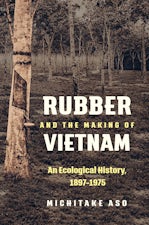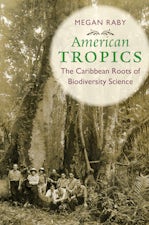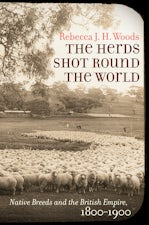Environments of Empire
Networks and Agents of Ecological Change
Edited by Ulrike Kirchberger, Brett M. Bennett
278 pp., 6.125 x 9.25, 2 tables
-
Paperback ISBN: 978-1-4696-5593-2
Published: April 2020 -
E-book EPUB ISBN: 978-1-4696-5594-9
Published: February 2020 -
E-book PDF ISBN: 979-8-8908-5892-4
Published: February 2020 -
Hardcover ISBN: 978-1-4696-5592-5
Published: April 2020
Flows, Migrations, and Exchanges
Buy this Book
- Paperback $32.50
- Hardcover $99.00
- E-Book $22.99
For Professors:
Free E-Exam Copies
Contributors: Brett M. Bennett, Semih Celik, Nicole Chalmer, Jodi Frawley, Ulrike Kirchberger, Carey McCormack, Idir Ouahes, Florian Wagner, Samuel Eleazar Wendt, Alexander van Wickeren, Stephanie Zehnle
About the Authors
Ulrike Kirchberger is a research fellow at the University of Kassel in Germany.
For more information about Ulrike Kirchberger, visit
the
Author
Page.
Brett Bennett is associate professor of history at the University of Johannesburg and Western Sydney University.
For more information about Brett M. Bennett, visit
the
Author
Page.
Reviews
“Readers are left with a range of new perspectives and methodologies that examine the varied aspects of ecological imperialism. Agricultural historians will find the collection especially helpful given that many of the essays focus on the development of colonial and modern agricultural practices.”--Agricultural History
“This work broadens the focus to include a more diverse set of case studies drawn from the Ottoman, French, British, Dutch, and German Empires, thereby allowing a wider scope of comparative and transnational analyses. . . . The various contributing authors present detailed, expansive histories drawing on a range of theoretical approaches. . . . [to] bring the importance of ecological factors for the study of empires further to the center of attention.”--CHOICE
“…Environments of Empire is a particularly welcome addition to the flourishing area of environmental studies.” – Isis
"This collection provides tantalizing insights into all manner of imperial, trans-imperial, and transnational exchanges, and turns our attentions to the enormous riches of non-English language sources and scholarship."--Ruth Morgan, Monash University




